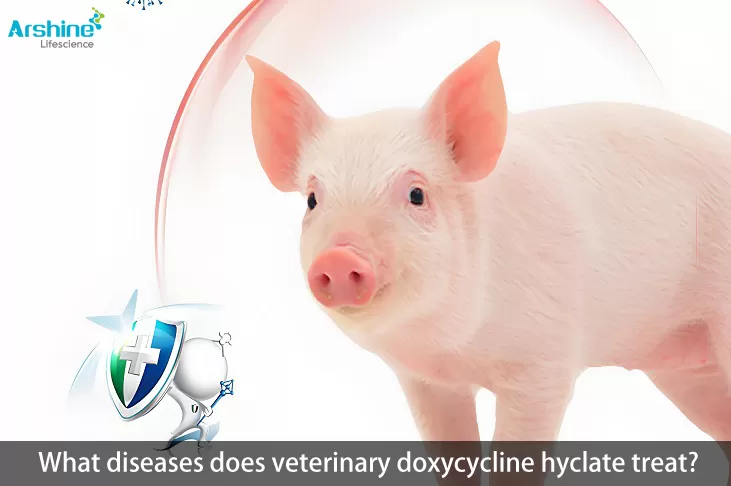

Veterinary Doxycycline Hyclate, also called doxycycline hydrochloride or deoxytetracycline, is a tetracycline antibiotic that has been widely used in veterinary clinics due to its broad-spectrum bacteriostatic properties. Compared to traditional oxytetracycline, doxycycline hyclate has 2 to 10 times higher antibacterial activity, making it an essential drug in livestock and poultry farming. This article will detail the main treatment targets and clinical applications of veterinary doxycycline hyclate.
Doxycycline hyclate performs particularly well in treating respiratory diseases in livestock and poultry. Respiratory diseases are common in animal farming, including asthma, swine plague, atrophic rhinitis, etc. These diseases often cause symptoms like panting, coughing, and difficulty breathing in pigs, and may even lead to purple ear tips and full-body redness in severe cases. Poultry may also suffer from acute or chronic respiratory diseases, showing symptoms such as nasal discharge, tearing, open-mouth breathing, and tracheal rales. Doxycycline hyclate can effectively inhibit the pathogens behind these diseases, including bacteria, mycoplasma, and chlamydia, thereby quickly relieving symptoms and restoring animal health. In practice, doxycycline hyclate is often combined with florfenicol and antipyretics to enhance treatment efficacy.
Digestive tract infections are another common disease type in livestock farming, and doxycycline hyclate also shows significant therapeutic effects in this area. Diseases like piglet yellow-white diarrhea, swine dysentery, and piglet paratyphoid can cause animals to pass yellow, gray-white, dark green, or bloody loose stools, severely affecting their growth performance and health. Poultry may also suffer from colibacillosis, pullorum disease, paratyphoid, fowl cholera, necrotic enteritis, etc., manifesting as white rice-water-like stools, watery diarrhea, or red-to-dark-brown tar-like feces. Doxycycline hyclate improves the intestinal environment by inhibiting the growth of pathogenic bacteria, effectively treating these digestive tract diseases. In severe cases, doxycycline hyclate can also be combined with other antibiotics like sulfonamides for better therapeutic results.
Doxycycline hyclate also demonstrates unique efficacy in treating certain special diseases in livestock. For example, abortions in pregnant sows caused by pathogens like leptospirosis and chlamydia have long been a challenge for farmers. Doxycycline hyclate can effectively inhibit the growth of these pathogens, thereby preventing and treating sow abortions. Additionally, doxycycline hyclate shows significant effects in treating porcine eperythrozoonosis. Eperythrozoonosis is a blood protozoal disease caused by Eperythrozoon, leading to symptoms like fever, yellow urine, and skin redness in pigs. When treating eperythrozoonosis, doxycycline hyclate is typically used with sulfonamides for more pronounced effects. To enhance treatment efficacy, it can also be combined with Shuanghuanglian, lincomycin, and other drugs to clear heat, detoxify, reduce inflammation, relieve pain, neutralize stomach acid, and alkalize urine.
The widespread use of doxycycline hyclate in veterinary clinics is closely tied to its unique pharmacological characteristics. First, doxycycline hyclate features high antibacterial efficacy, low toxicity, a broad antibacterial spectrum, and fast, high absorption rates. Physically, it appears as a yellow (light yellow) powdered drug with a bitter taste and good water solubility. However, it easily forms complexes with metal ions in water, reducing its efficacy. Therefore, when selecting doxycycline hyclate products, priority should be given to those with stable formulations and guaranteed effectiveness. Second, doxycycline hyclate is absorbed quickly after oral administration, reaching peak effects in about 3 hours and maintaining prolonged action in the body. Additionally, doxycycline hyclate has antitussive, expectorant, and antiasthmatic effects, which have been confirmed in animal experiments and are unique among antibiotics.
However, attention must be paid to its potential side effects and precautions when using doxycycline hyclate. It has certain liver and kidney toxicity, so animals with severe liver or kidney damage should use it cautiously, and long-term use should be avoided. Generally, the treatment duration should be 5–7 days and not exceed 7 days, as prolonged use may cause gastrointestinal disturbances, leading to adverse reactions like anorexia, vomiting, or diarrhea. Moreover, doxycycline hyclate can easily cross the placenta and enter milk, so it is contraindicated in pregnant and lactating animals. When using doxycycline hyclate, concurrent administration with trace elements like calcium, phosphorus, iron, and aluminum, baking soda, or dairy products should be avoided to prevent reduced efficacy.
In veterinary clinics, the applications of doxycycline hyclate are not limited to the diseases mentioned above. It can also be flexibly used based on specific conditions and pathogen types. For example, it shows good efficacy in treating abscesses caused by Actinomyces. Actinomyces is a bacterium that can grow in various parts of livestock bodies, and the resulting abscesses usually require surgical removal. However, doxycycline hyclate can inhibit Actinomyces growth, alleviating the condition and creating favorable conditions for surgical treatment.
In summary, veterinary doxycycline hyclate is widely used in clinical practice due to its broad-spectrum bacteriostatic properties, high efficacy, low toxicity, and rapid absorption. It shows significant therapeutic effects in treating respiratory diseases, digestive tract infections, and special conditions in livestock. However, attention must be paid to its potential side effects and precautions to ensure safe and effective use. With continuous advancements in veterinary technology and the ongoing development of livestock farming, the applications of doxycycline hyclate will become even more extensive.
Add: Block 14, No.100, Luyun Road, Changsha 410205, Hunan, China.
Email: info@arshinevet.com
WeChat: +8618874001228
WhatsApp: +8615697311407
Tel:86-731-82294958